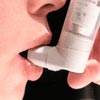Drugs Treatments for Asthma

![]() A health article fromYour Health Online the A to Z directory of dealing with Health Problems & nutritional Self Care Strategies
A health article fromYour Health Online the A to Z directory of dealing with Health Problems & nutritional Self Care Strategies
Medication is the cornerstone of asthma treatment and the main way asthma is controlled. Asthma medications can be divided into two basic categories:
1. Anti-inflammatory medications, also called long-term controller medications:
o Work slowly and last a long time.
o Reduce the inflammation that makes the bronchial tubes overly sensitive.
o Must be used on a regular basis to be effective. Those with persistent asthma will need to take anti-inflammatory medication daily.
o Are considered a first line of preventive care because they help to prevent asthma attacks from starting. However, they do not immediately stop asthma attacks once they've begun.
2. Bronchodilators, also called quick-reliever (rescue) medications:
o Work quickly and last for varying periods of time
o Open narrowed airways and relieve bronchoconstriction (spasms of the airways)
o Do little to reduce the chronic inflammation that makes bronchial tubes overly sensitive
o Help stop asthma attacks once they've begun, and are often used on an "as-needed" basis
Your doctor will determine the type of medication that you will use based on your asthma classification. Generally, if you have intermittent asthma, you are only given quick-relief medication. If you have persistent asthma, your doctor will probably want you to use both long-term controller and quick-relief medications. People with exercise-induced asthma (EIA) may be told by their doctor to take either long-term controller or quick-relief medication right before they exercise to prevent symptoms.
Asthma medications come in all sorts of forms -- sprays, pills, powders, liquids and shots -- and are sold under many brand names. New medications frequently come on the market. So, if you have been on the same medications for five or more years, particularly if you do not have good control (frequent symptoms, nighttime asthma), check with your doctor to see if another type of medication might be better for you.
Medications that are swallowed in pill or liquid form usually have systemic, or total body, side effects. Inhaled medications go primarily to the lungs, decreasing the overall side effects. Medications vary as to "onset of action," or the amount of time it takes to feel the results. Another variable is when the peak, or maximal effect, occurs. If you are taking medication to prevent problems with nighttime asthma or with exercise-induced symptoms, you will want to coordinate the drug's effects with the timing of these activities. Unwanted side effects and cost are two other important factors in choosing which medications would be best for you.
Control medications (anti-inflammatory medications)
Once asthma has been diagnosed, many patients start on controller medicine, also called long-term preventative medication or maintenance medication. These medications are taken daily on an ongoing basis to calm the airways and control symptoms. The different types of medication in this category work by reducing inflammation, thereby opening the airways, and improving breathing ability.
Types of long-term control medications include inhaled corticosteroids cromolyn sodium and nedocromil sodium and long-acting beta-agonists (beta-adrenergic agonists).
Corticosteroids
Inhaled corticosteroids are the most effective medications to prevent swelling and irritation in the lining of inflamed airways. Dry powder or aerosol are the commonly prescribed forms.
Inhaled corticosteroids are used as daily controller medications in those with persistent asthma. They are a type of steroid medication that is related to cortisone, a hormone produced naturally by the adrenal glands. They block the chemicals in your body that cause inflammation and can take a week or more to start working fully. However, inhaled corticosteroids are not the same as anabolic steroids used illegally by some athletes. They are safe for long-term use since they are targeted directly at the lungs and do not affect the liver or cause sterility, as do the illegal anabolic steroids.
Patients switching from an oral steroid like prednisone, to an inhaled steroid need to be careful. While adjusting to the switch, one may not be able to handle major stress such as surgery or severe infection or trauma without additional systemic steroid. Discuss with your health care provider.
Brand Name Generic Name
Beclovent®
Vanceril®
Vanceril DS®
QVAR® beclomethasone
dipropionate
Beclomethasone
Pulmicort Turbuhaler® Budesonide
AeroBid®
AeroBid®-M Flunisolide
Flovent®
Flovent Rotadisk® fluticasone propionate
Azmacort® triamcinalone acetonide
If taken as directed, inhaled corticosteroids do not cause the potentially serious side effects that can occur with the regular use of oral corticosteroids. Still, inhaled corticosteroids do have side effects (as does any medication): hoarseness can occur with increasing dosages and vocal stress; thrush (a yeast infection in the mouth) and mouth irritations are the most common. Use of a spacer (an attachment on the inhaler), and rinsing with water and spitting out after inhaling a dose can minimize the side effects. Some studies have suggested an increased risk of cataracts.
Women who take large doses of inhaled corticosteroids because of severe asthma may experience bone density loss after menopause. In the New England Journal of Medicine, researchers reported an increased risk of glaucoma formation with older adults using inhaled corticosteroids.
In addition, there has been some concern regarding possible growth retardation in children, which appeared to be dose related: The longer corticosteroids are used and the higher the dosage, the more likely growth stunting is to occur. However, results from two studies appearing in the New England Journal of Medicine independently concluded that inhaled corticosteroid use in children has no long-term impact on growth and that the potential risks were balanced by the benefits of improved asthma control.
the A to Z directory of dealing with Health Problems & Self Care Strategies for natural remedies to your health issues.

Subscribe to get your weekly "Health Success Magazine" with a new complete & comprehensive Health Report in every edition!

to “Your Health Success”
our weekly F’R’E’E’ Newsletter
If you would like a free no-obligation private consultation or to contact Warren Tattersall for more information, please click here >> Contact Us

Click the books above to learn more about how we treat CFS naturally, to get your life back!
You will find many assorted Health Reports available for download free to you on this website!
Our free Health Success Reports are each available for you to download when you subscribe to receive them and their 7 part eCourse.
You can unsubscribe at any time, but we are sure you will want to receive all the email lessons of these informative ecourses.
Read more HERE to select the REPORT subjects of most interest (or concern) to you.









